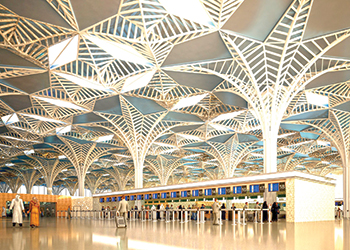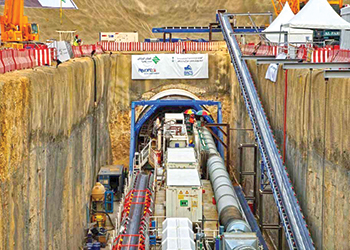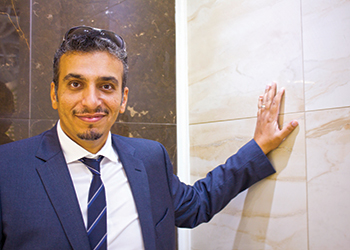
 Mneefah at work.
Mneefah at work.
Tunnelling works were launched last month on two further lines of the Riyadh Metro, marking important milestones in the construction of the Saudi Arabia’s first underground rail system, which on completion will be one of the largest in the world.
A consortium led by global engineering, project management and construction company Bechtel – known as BACS – has begun tunnelling on Line One while the ArRiyadh New Mobility Consortium (ANM) has initiated tunnelling works on another line (Orange Line) of the 176-km Riyadh Metro.
The BACS consortium, in charge for lines One and Two, also includes Saudi-based Almabani General Contractors, regional company Consolidated Contractors Company, and Germany’s Siemens. It is responsible for the $10-billion contract for the design, construction, supply of train cars, signalling, electrification and integration of lines One and Two.
In total, seven tunnel boring machines (TBMs) will be deployed by the Bechtel-led team to dig and construct more than 35 km of tunnels beneath the capital city for the two lines, Bechtel said.
Currently, the first tunnel boring machine, Mneefah, (named after the horse of Saudi Arabia’s founder King), will steadily ramp up to its planned average tunnelling rate of about 100 m per week on Line One and is expected to complete its work on both lines by mid-2016, it added.
The work includes 39 stations, two of which are key interchange stations: Olaya Station, situated in the centre of Riyadh at the intersection of lines One and Two, and King Abdullah Financial District Station, located slightly to the north on Line One.
The ArRiyadh New Mobility Consortium, responsible for the construction of the Orange Line, is led by Salini Impregilo, an Italian industrial group specialising in the construction and civil engineering business. It includes Ansaldo STS of Italy, Larsen & Toubro of India, Nesma of Saudi Arabia and Bombardier of Canada.
The group has entered the tunnelling phase of the construction of the Orange Line with the launch of the TBM Jazlah. The 10-m-wide TBM weighing approximately 700 tonnes has started boring on the 5.8-km tunnel in the downtown area of Riyadh and will pass through the Riyadh main train station, said Salini Impregilo.
The 41.2-km Orange Line, which is currently under construction, will run from the King Khaled International Airport to the new King Abdullah Financial District (KAFD). It is one of the six lines of the Riyadh Metro, which features 85 stations including underground, elevated and at-grade sections.
The route is mostly elevated along the western part of Al Madinah Al Munawwarah Road, then underground in bored and mined tunnels in the central section of the line, and generally at-grade along Prince Saad Ibn Abdulrahman Road in the east.
The Orange Line features 22 stations, including two iconic stations – Qasr Al Hokm and Western – designed by Snøhetta and Omrania. The line includes also six ‘Park&Ride’ sites that will contribute in the future to the integration between transportation systems, said Salini Impregilo.
Construction of the Riyadh Metro, which is part of the Riyadh Public Transport Project (RPTP), started in April 2014 and is due for completion by 2018.
The Fast consortium, led by FCC first broke ground on the metro project when it started tunnelling work in April this year. Fast, which is building lines Four, Five and Six for $6.69 billion, comprises Korean company Samsung, French company Alstom Strukton of The Netherlands, Freyssinet Saudi Arabia, Typsa of Spain, Atkins of the UK, and Setec of France (see also Contractors feature).





















_0001.jpg)


.jpg)
















.jpg)








.jpg)



